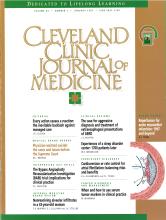Table of Contents
In This Issue
Editorial
- Every action causes a reaction: the inevitable backlash against managed care
We should be wary of getting carried away with HMO-bashing, lest we create a nightmarish system that has all the limited choices of managed care—without reducing costs.
Medical Grand Rounds
- Reperfusion for acute myocardial infarction: 1997 and beyond
The optimal thrombolytic therapy will be a cocktail of several thrombolytic, antithrombotic, and antiplatelet agents, each of which attacks different pathways of clot formation.
- The constitutionality of physician-assisted suicide: the cases and issues before the US Supreme Court
How the Court rules on physician-assisted suicide will spur further legal debate for decades.
Interpreting Key Trials
- The Bypass Angioplasty Revascularization Investigation (BARI) trial: implications for clinical practice
Both PTCA and CABG have their own inherent advantages and disadvantages, which must be weighed in the treatment decision for each patient.
Internal Medicine Board Review
- Nonresolving alveolar infiltrates in a 43-year-old woman
A 43-year-old woman presents with a 1-year history of intermittent nonproductive cough. What is the diagnosis and treatment?
Cancer Diagnosis and Management
- When and how to use serum tumor markers in clinical practice
Clinicians have long wanted a simple test sensitive enough to detect cancer in its early stages, yet specific enough to not produce false-positive results. Unfortunately, no such ideal test exists, or is likely to.
Cardiology Dialogues
- Cardioversion or rate control for atrial fibrillation: balancing risks and benefits
In managing atrial fibrillation, should physicians try to restore and maintain sinus rhythm, or take a more conservative approach and try only to control the heart rate and prevent thromboembolism?
Clinical Reviews
- Extraesophageal presentations of gastroesophageal reflux disease: the case for aggressive diagnosis and treatment
GERD often causes noncardiac chest pain, asthma, and ear, nose, and throat problems. Aggressive prevention of acid reflux, using either drugs or surgery, is the key to treatment.
- Experiences of a sleep disorders center: 1700 patients later
Sleep studies reveal many patients to have specific sleep abnormalities different from what might be suspected from the clinical history.



